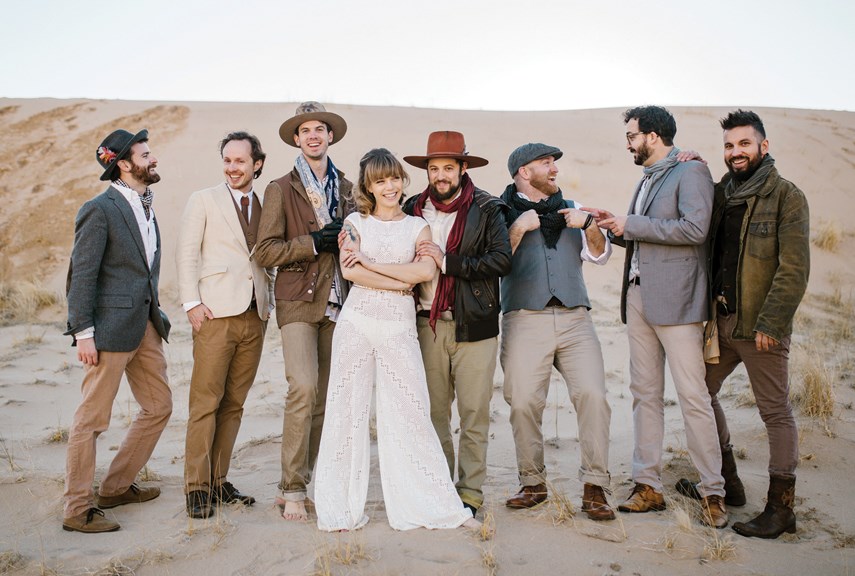A Celebration of The Band at Kay Meek Arts Centre with Dustbowl Revival and Hot Club of Cowtown, Tuesday, Jan. 15, 7:30 p.m., Grosvenor Theatre. For more information and to order tickets visit kaymeek.com.
It ended Thanksgiving night, 1976.
That was when The Band played their now-legendary Last Waltz. Joined by Ronnie Hawkins, Muddy Waters, Neil Young and a host of other musical forces, The Band ran through beloved tunes like “Up on Cripple Creek,” “The Shape I’m In,” and “The Weight.” One last refrain and then goodnight, goodbye. Disbanded.
But more than 40 years after their curtain call, that sound of Americana played by a group that was 80 per cent Canadian still inspires, explains Zach Lupetin, founder of roots band The Dustbowl Revival.
“They’re like our musical spirit animals,” he says.
The Dustbowl Revival and western swing ensemble Hot Club of Cowtown are set to pay tribute to The Band with a Jan. 15 show at Kay Meek.
Featuring trumpet, trombone, fiddle and mandolin, The Dustbowl Revival can “shapeshift in and out of a lot of different types of American folk music,” Lupetin says, explaining their ability to combine New Orleans-flavoured jazz with blues and folk. “Sometimes people think that those are completely separate worlds but they’re not. It’s all part of the American roots experience.”
A Chicago native, Lupetin headed to L.A. like: “many of the hopeful young men from the Midwest who go to film school and want to write for the movies.”
But music was “the obsession that won’t leave me alone,” he says, describing musical tastes that stretch from Louis Armstrong to Wilco to West Africa.
The film industry wasn’t particularly encouraging for a lonely writer, but Lupetin used his sense of spectacle in forming the eight-piece (and sometimes more) band.
“Part of the reason I wanted a big band . . . is that it’s hard to ignore us,” he says. “When you show up somewhere you’re going to make an impact.”
In his review of The Last Waltz concert documentary, Roger Ebert noted how exhausted and joyless The Band looked on stage.
“These are not musicians at the top of their art, but laborers on the last day of the job,” he writes.
That fatigue is understandable.
Over 16 years they’d been the Hawks, the Crackers, the Levon Helm Sextet, the folk music turncoats aiding and abetting newly-electric Bob Dylan, and, due to a bit of record company idiocy, the Canadian Squires.
But before the road weakened the warriors, they were energetic and joyous.
Music From Big Pink, their 1968 debut, was “an event,” according to the Rolling Stone review penned by Al Kooper.
Rock group Nazareth picked their name after listening to “The Weight.” In the memoir Slowhand: The Life and Music of Eric Clapton, author Philip Norman chronicles the way Music From Big Pink fomented Clapton’s dissatisfaction with his band, Cream.
“We were stuck and I wanted out,” Clapton reflects.
Cream was imprisoned by precision. Nothing The Band did was perfect except their songs. And while graffiti artists elevated Clapton to God status, Robbie Robertson was becoming a guitar antihero.
In the liner notes for the 2000 reissue of Music From Big Pink, music writer Rob Bowman quotes Robertson discussing what had been his angry, screaming, vengeful guitar solos.
“My guitar playing was like a premature ejaculation,” Robertson reflects.
But inspired by Curtis Mayfield, Robertson decided to play riffs, not solos, with The Band.
That sense of five musicians and zero soloists and their “poetically mysterious” lyrics give The Band a timeless quality, Lupetin says.
“I think you have a renewed appreciation – as a musician – for how well-crafted some of these songs are,” he says. “It’s like party poetry.”
Despite growing up with The Band, Lupetin isn’t sure whether “Up On Cripple Creek” is about a drug trip or an affair. And sometimes, when singing “The Weight,” he still finds himself wondering who Carmen and Chester really were.
“Like a good Shakespeare play, it can be interpreted in many ways,” he says.
His co-headliner should be up the challenge, he says.
“Hot Club of Cowtown is honestly one of the best in the business at interpreting classic acoustic music and making it spontaneous and energetic and fun,” he says. “Even though it’s in a nice theatre, it should get a little rowdy in there.”
It’s also a thrill to head back to Canada, he adds.
“We always appreciate how ruthlessly pleasant you all are.”



